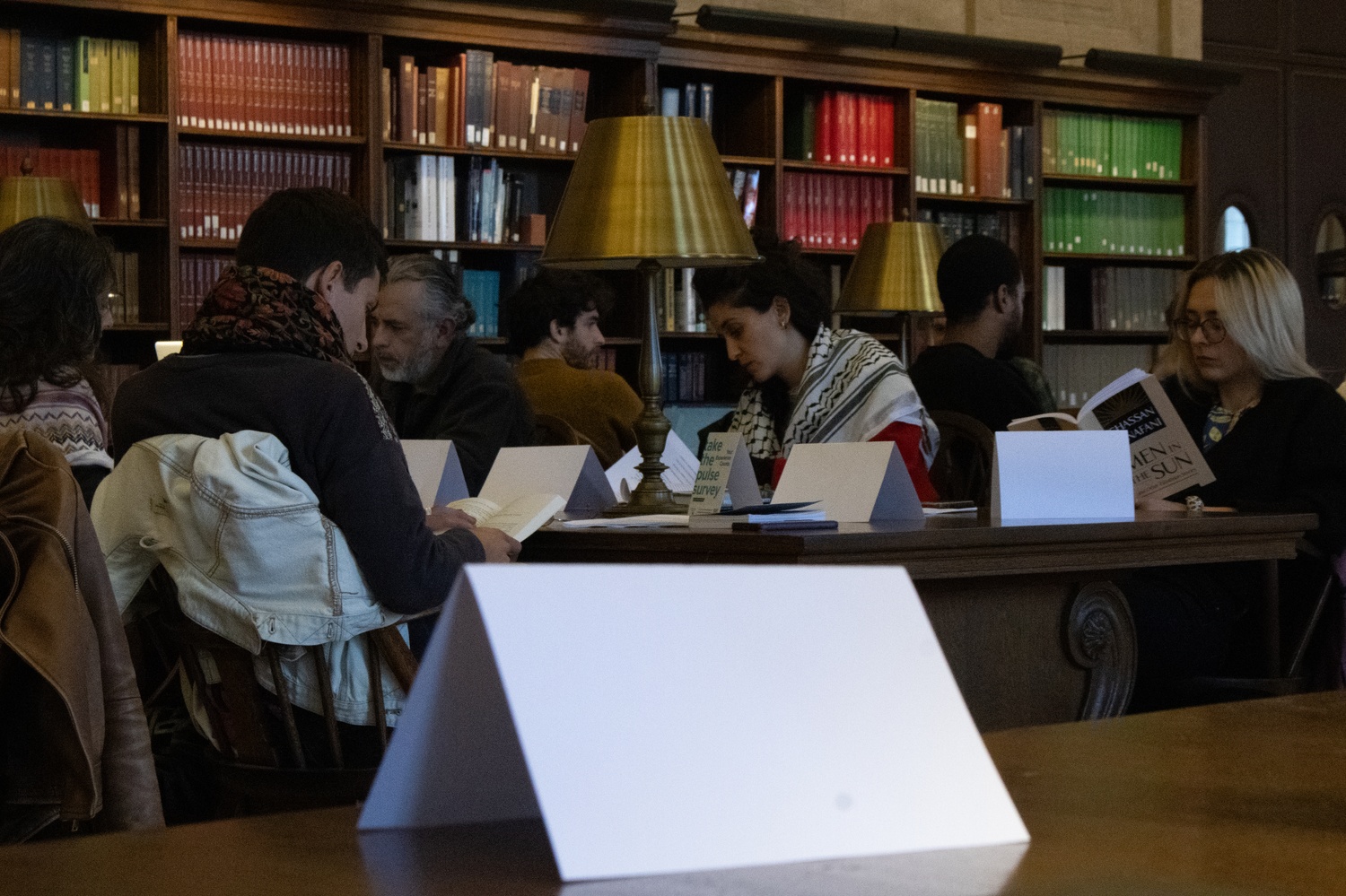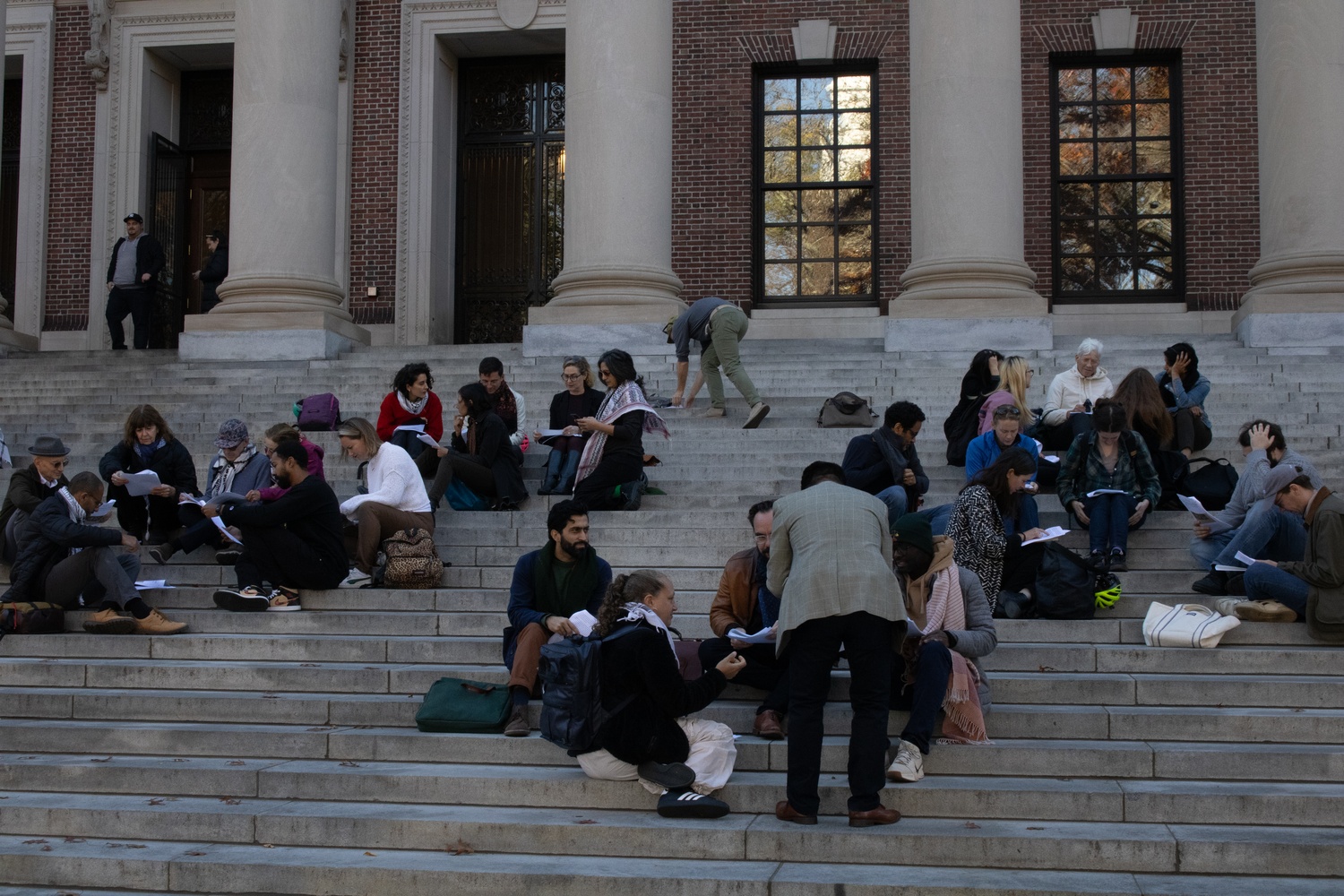
News
Harvard Researchers Develop AI-Driven Framework To Study Social Interactions, A Step Forward for Autism Research

News
Harvard Innovation Labs Announces 25 President’s Innovation Challenge Finalists

News
Graduate Student Council To Vote on Meeting Attendance Policy

News
Pop Hits and Politics: At Yardfest, Students Dance to Bedingfield and a Student Band Condemns Trump

News
Billionaire Investor Gerald Chan Under Scrutiny for Neglect of Historic Harvard Square Theater
No ID Checks, but Harvard ‘Determining Next Steps’ After Second Faculty Study-In

Roughly 35 Harvard faculty members and library staff held a silent study-in in Widener Library on Friday afternoon, marking the second time faculty have gathered in the library to denounce the temporary bans on students who staged similar protests.
Participants silently read at library tables with blank paper table tents — a gesture designed to invoke the sheets of A4 paper held by protesters in Hong Kong to decry the city’s 2020 criminalization of speech promoting “subversion” or secession from China.
Before the study-in, protesters held a rally outside Widener where speakers zeroed in on Harvard’s January ban on protests in libraries, arguing that it contradicted the University’s own free speech rules and represented a capitulation to rising illiberalism.
During Friday’s study-in, which lasted approximately 30 minutes, no library staff or security guards checked participants’ Harvard University IDs. At every previous study-in, administrators have relied on ID checks to issue two-week suspensions of participants’ access to the library where they protested.
However, three University personnel who have regularly conducted ID checks watched protesters as they left the Friday study-in.
It’s not clear whether the break from precedent represents a new phase of Harvard administrators’ standoff with library protesters. University spokesperson Jason A. Newton declined to say whether administrators would issue warnings or disciplinary sanctions to participants.
“The university and library administration will continue to gather information about the action that took place in Widener Library’s Loker Reading Room today before determining next steps,” he wrote in a statement.
Newton also declined to say whether the University was aware of the action before it took place. Unlike the last faculty protest, organizers did not notify administrators in advance of their study-in.

Friday’s protest began with a gathering on Widener’s front steps, where attendees listened to a pair of speeches.
Harvard Medical School lecturer Aaron D.A. Shakow argued that Harvard administrators’ Jan. 19 guidance on the University-Wide Statement on Rights and Responsibilities — which prohibited protests in libraries — stood in “direct defiance” of the free speech rules it was intended to clarify.
“Their bulletin last January upended the existing written precedents of all of the schools at Harvard addressing protest and dissent in our academic community,” Shakow said. “In their place, they substituted vague and undefined restrictions to be specified and exploited at their whim.”
He criticized Harvard’s top administrators for adopting the guidance “with no consultation whatsoever,” despite language in the USRR that urges officials to consult with stakeholders before adopting speech regulations and warns that failure to do so “may be profoundly damaging to the life of the University.”
Newton declined to comment on Shakow’s criticisms. University administrators, including University Librarian Martha J. Whitehead and Faculty of Arts and Sciences Dean Hopi E. Hoekstra, have defended the protest ban as a necessary step to protect libraries as places of quiet reflection.
After Shakow’s speech, Schlesinger Library cataloger Jonathan S. Tuttle read portions of a Crimson op-ed he penned with Harvard Law School librarian Maya H. Bergamasco, alleging that the bans represented a crackdown on pro-Palestine speech.
“Libraries are not neutral — no institution or body of people can ever truly be,” Tuttle said. “In fact, claiming neutrality creates a chilling effect and facilitates the suppression of dissenting voices by mainstream ones.”
Protest attendees then split into small groups to discuss readings on free speech, dissent, and “the historical role of libraries in anti-fascist resistance.” After another 15 minutes, they walked — silently and single-file — into Widener’s main reading room.
There, participants sat with blank placards and read books chosen to represent speech they alleged Harvard was trying to silence. The improvised reading list included Antony Loewenstein’s The Palestine Laboratory, Theodor Adorno’s Minima Moralia, and Ta-Nehisi Coates’ The Message.
—Staff writer Tilly R. Robinson can be reached at tilly.robinson@thecrimson.com. Follow her on X @tillyrobin.
Want to keep up with breaking news? Subscribe to our email newsletter.
Related Articles
Most Read
- More Than $110 Million in NIH Grants to Harvard, Affiliated Hospitals Terminated Since Late February
- After Trump’s Demands, Dean of Students Says College Diversity Offices Have No Plans To Cut Programming
- Pritzker Says Harvard Is ‘All Over’ Supporting Students Whose Visas Were Revoked
- Harvard Is Turning Its Back on Scholasticide in Palestine
- Visas Revoked for 4 More Harvard Students and 3 Recent Grads, Bringing Total to 12
